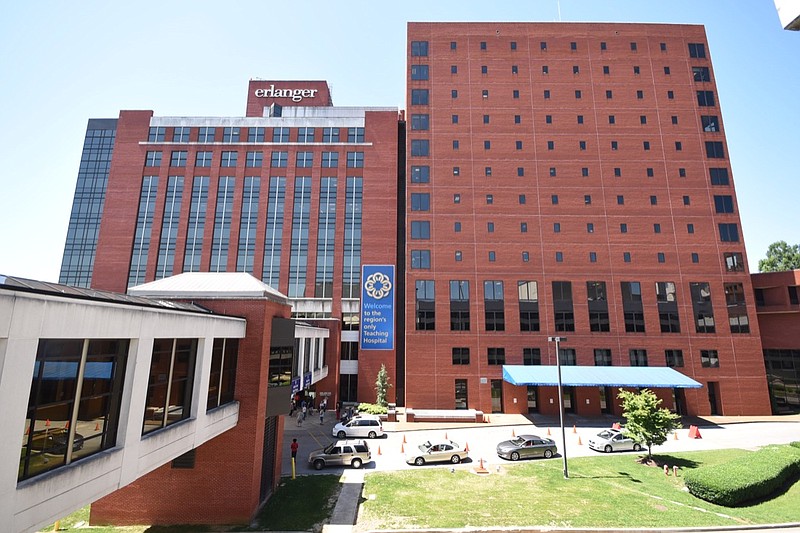Erlanger Health System on Monday laid off employees, including members of upper management, as new financial reports revealed the hospital ended fiscal year 2019 with a $4.4 million loss and the first quarter of fiscal 2020 with a $4.5 million loss.
Erlanger officials confirmed in a statement Monday afternoon that 30 positions were eliminated and restructured. The financial reports were released at the Erlanger Board of Trustees' budget and finance committee meeting Monday evening.
This time last year, Erlanger had ended the fiscal year with a $500,000 income and the first quarter with a $2.6 million loss. Erlanger had budgeted a $2.5 million net loss for the first quarter of fiscal year 2020, which began July 1, but exceeded that projection due to lower-than-expected patient numbers and high operating costs.
The layoffs come a month after Dr. Will Jackson took over as the hospital's new chief executive officer. Jackson's main directives from the board are to address physician relations, reorganize the hospital's management structure and reorganize the governance structure of Erlanger Medical Group. When former CEO Kevin Spiegel took the helm in 2013, Erlanger had fewer than 100 employees who were considered management. Before Monday's layoffs, the health system employed about 280 managers.
"Over the past few months we have re-examined the management structure of our organization in detail, and we are confident [Monday's] action will enable us to act more decisively and efficiently for the benefit of our patients and community," Jackson said in the statement.
Erlanger Board Chairman Mike Griffin added, "Dr. Jackson has the full support of the Board in making these very tough decisions." Griffin said after Monday's meeting that no more layoffs are planned.
Despite the hospital's lackluster financial reports, independent auditors found the number of patients coming to Erlanger continued to grow at a rate that outpaces the flat market. For the last five years in Tennessee, Erlanger has led the state in patient growth, with a 38.6% overall increase. The next closest health system was in the low 20% range for the same time period, according to the audit report.
Overall, Erlanger's net position increased by about $11 million in fiscal year 2019. Net patient revenue surpassed $1 billion in fiscal year 2019, up from $944 million the prior year, with a 2.7% increase in admissions and an 11% increase in physician practice outpatient visits.
Erlanger was also able to stabilize some financial metrics that took a hit in fiscal year 2018 as the health system worked out billing issues and other kinks from its new electronic medical record software. Days cash on hand - a calculation of how many days Erlanger could fund its operating expenses without bringing in additional revenue - increased from 67 at the end of last year to 74 as of June 30. Net days in accounts receivable - how many days pass from when a bill leaves until payment arrives - also improved from 68 to 55.
"Erlanger recognized that past growth rates, as significant as they may have been, could not be sustained even with new and expanded facilities," the report states. It goes on to say, "as anticipated, [challenges with moving patients efficiently through the hospital] and capacity limitations were operational hurdles that served to limit growth consistent with prior experience."
Erlanger officials project continued growth in fiscal year 2020 but at a slower rate than what was projected for 2019.
Britt Tabor, Erlanger's chief financial officer, said a new option for patients to pay in installments is helping facilitate cash flow, but reining in expenses - particularly premium overtime - remains a top priority.
Other factors affecting the first quarter finances were a decline in regional transfers, fewer emergency room patients being admitted to inpatient care, below-budget discharges of patients with commercial insurance, and an average length of stay that was higher than budget and the previous year despite improvements. A highlight was that outpatient surgeries for the quarter exceeded budget and the prior year.
Tabor said it's too soon to say how much money Monday's restructuring will save the health system, but in addition to the reduced salary expenses it will improve efficiency by streamlining decision making.
At the last board meeting in August, Erlanger trustee Linda Moss Mines said Erlanger needs "to demonstrate that we're willing to be a lean machine that has creative and innovative ways of addressing issues - not just throwing personnel at those issues."
"Especially when we're providing somewhere around $135 million in uncompensated care," she said. "We have to always keep our eyes on why we're here, and that's patient care and quality."
Contact Elizabeth Fite at efite@timesfreepress.com or 423-757-6673.
